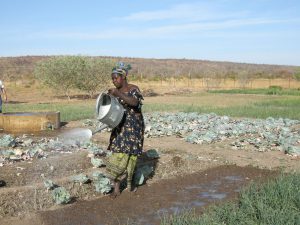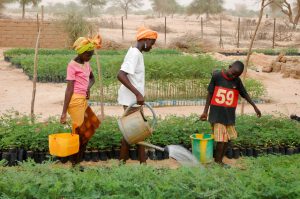by Jennifer Dees
You know when you get home from the grocery store, and you realize that if you put five bags on each arm, you won’t have to make another trip? And then you struggle with the doorknob because you somehow always forget there’s a door? And when you finally drop it all onto the counter, your arms have red marks and your fingers have already gone numb?
Count yourself lucky that the walk was only from your garage to your kitchen.
In Niger, West Africa, it’s the women and girls who are responsible for walking miles every day to find water. If the sources they’ve gone to before haven’t dried up, they return carrying gallons of water. That effort causes severe pain, not to mention the hours walking in over 100 degree weather.
Back at your home, imagine you discover the bananas have turned brown, the bread is moldy, and the cans of soup have flies in them. Of course they go straight in the trash.
Meanwhile, 61 percent of Nigeriens would be surprised to discover clean water. The brown water only serves to hide the dangerous contaminants, which lead to disease, birth defects, and death. In fact, 1 in 7 children in Niger die before the age of five. Mothers give this water to their children knowing it will may make them sick, but they have no other choice.
You return to the store, file an extensive complaint, and return with fresh food (probably not from the same store). I tend to go overboard when I shop without a list, picking up whatever looks good. There are so many options; I can get pineapples and avocados in places where they don’t grow.
In some places in Niger, it rains as little as two centimeters annually, which makes it difficult to grow food most of the year. Most people survive off livestock or food from markets, something that is unfeasible for a family with little income. According to the Food and Agriculture Organization of the United Nations, the average Nigerian eats a thousand calories fewer a day than the average American. Many women would love the opportunity to grow and sell their own food, but without enough water, it’s simply not possible.

When you’re done shopping, you have the rest of the day to work, spend time with loved ones, or pursue other interests. You probably don’t plan on grocery shopping again for at least a week.
The process of getting water takes up nearly half a day in Niger, time the women could be using to earn money or care for their young children, and time the girls should be using to go to school. According to a UNESCO report, only 62% of Nigerien girls completed primary school in 2015. The African Bureau Information Center reports that, on average, girls who were enrolled in school drop out within five years. With the daily burden of retrieving water, the women and girls of Niger lose much of their freedom and hope for future generations.
Wells Bring Hope’s mission is drilling wells to provide clean, safe water to Nigerien villages, but that is just the beginning of the transformation. We educate villagers on sanitation and hygiene practices. We provide well maintenance training to community members to ensure sustainability. We help the women to establish savings groups, and we provide them with micro-finance training. Armed with that training and the time that they no longer spend walking for water, the women start their own small businesses, including selling produce grown with water from the new well. Girls can return to the classroom. In short, entire communities are transformed.

These are goals that you can help achieve. It can be easy to take resources for granted when they’re just a quick drive away at the local supermarket. To help yourself and your friends understand a little more about what it’s like for people in Niger, you can start a Water Circle. All donations go directly to drilling wells that immediately start improving the lives of everyone in the village. And with your help, we can give a generation of Nigeriens hope for their futures.


